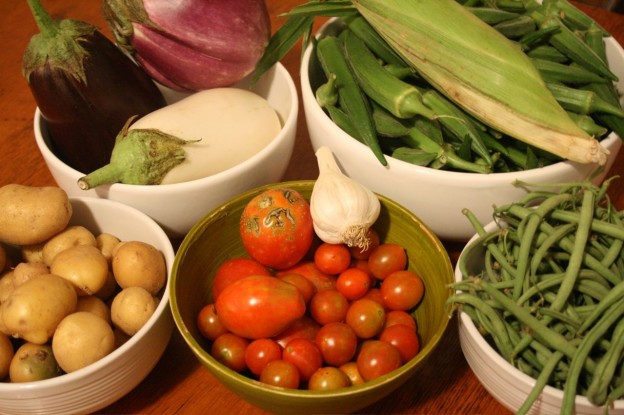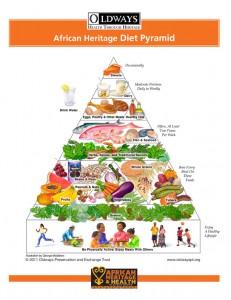
Photo: thebittenword.com/Flickr
For years now we’ve heard the health benefits of a Mediterranean Diet — its whole-grain, loooong on fresh produce and olive oil regimen, with lots of fish and a bit of red wine and dairy added in. For many of you reading, the Mediterranean way of eating is likely a near-daily routine, maybe even a mind set. The true challenge nowadays is not in accepting the tenets of the Mediterranean diet and incorporating it into your life, but in expanding the repertoire of recipes to keep it exciting at the table.
Not so a diet with African origins. Some of you may know what foods and traditional ways of eating stem from Africa and the African Diaspora, and eat those foods regularly. But for some Americans of African descent, those culinary traditions have been diluted over time through racial assimilation and further hampered by socioeconomic disparities. In other words, not all communities of color have access to fresh, affordable produce as often as they should, or need to, in order to cook the way their ancestors did.
Late last Fall, the Boston-based nonprofit Oldways, which aims to re-educate the public about nutritious, heritage-based ways of eating, launched an initiative aimed at restoring to African-American communities the heritage of health a diet based on African traditions represents. With the bold tagline, “Diabetes is not part of your heritage. Neither is heart disease,” Oldways has produced The African Heritage Diet and a wealth of supportive information. In addition, thanks to a $100,000 grant awarded earlier this month by the Walmart Foundation, Oldways will now have the financial backing to move ahead with an outreach program aimed at encouraging dietary changes in the African-American community nationwide.

Photo: courtesy of Oldways
Oldways’ copyrighted “African Heritage Diet Pyramid” is the visual corollary to the naturally healthy, tradition-based way of eating it promotes. The pyramid shape and message are familiar: at the pinnacle are foods to be eaten in the smallest of quantities; at the foundation are the staples of the diet.
So, spinach, collards, mustard and turnip greens rule the base in the African Heritage Diet Pyramid. Next come fruits, vegetables, whole grains (millet, sorghum) and tubers (sweet potatoes, yams, cassava, etc.). Beans, peanuts and nuts are the proteins most recommended; fish, in the form of tuna, mackerel, salmon and sardines, appear further up the pyramid. Flavor gets a boost from herbs, sauces and spice. Think curries, peppers, coconut, garlic and onion, fresh herbs and lemon. (The so-called “Holy Trinity” of Louisiana’s Creole cooking — celery, onions and red bell peppers chopped in equal parts — gives you a good sense of the mindset and the flavors.)
Given the vast scale of the geography and cultures behind the project, professionals from a range of disciplines worked with the Oldways staff to create the African Heritage Diet Pyramid. The brain trust of this Advisory Committee is impressive: nutrition scientists, culinary historians, public health experts, community activists, food writers and journalists, several of whom are Boston’s own: Robert Hall, Associate Professor of African American Studies and History at Northeastern University; Vivien Morris, Dietician and Director of Community Initiatives for the NFL Program at Boston Medical Center; and Frederick Douglass Opie, Professor of History and Foodways at Babson College.
The group of approximately 15 met in June, 2011, for an intense, full-day conference, where each expert presented on his/her area of expertise. By the end of the day, the committee had produced a first draft of the pyramid. Three drafts followed, with changes made by consensus. (According to Oldways’ President Sara Baer-Sinnott, the committee agreed to place greater emphasis on grains and less relative emphasis on oils because they are not a natural part of African heritage. Also, blueberry pie as an exemplary dessert became sweet-potato pie instead.) Oldways published the African Heritage Diet an impressive six months later. To date, it stands alongside four other diets in the Oldways roster offering “health through heritage.” These include the Mediterranean, Asian, Latino and Vegetarian Diet Pyramids.
Baer-Sinnott says that Oldways’ important “next steps” for the African Heritage Diet involve outreach. This means forging partnerships nationwide with community and faith-based organizations, traditionally black universities and colleges, and health care professionals. Each of these constituents, Baer-Sinnott insists, can help distribute literature, emphasize the health and familial benefits of following this tradition-laden diet, and teach interested families how to shop for, prepare and cook the recommended foods in a way that is economical and delicious.
One point of reference, the Oldways website is a treasure trove of information for eaters of any background interested in an African-based diet. There is the pyramid itself, how-to tips, links to health studies and gorgeous-looking recipes — called Plates of Expression — which pull from the four distinct regions of African heritage: West and Central Africa, South America, the Caribbean and the American South.
According to the Oldways philosophy, there is no end to the health returns of following one’s culinary heritage or, by extension, visiting someone else’s heritage for the day to borrow a recipe. There’s no end in sight for Oldways, either. Next on their historical, culinary agenda: the Native American Heritage Diet. Stay tuned.


Pingback: Out Of Africa: A Heritage Of Health | Public Radio Kitchen
Pingback: Out Of Africa: A Heritage Of Health – WBUR | Health News
I just posted a Ugandan recipe on my food blog, and when researching Ugandan recipes I noticed how few sources are available for exploring African cuisine (with the exceptions of Moroccan and Ethiopian dishes). I would love it if more restaurants and television programs would feature African countries’ traditional foods, it’s a shame that such a large part of the world is virtually ignored by the food industry.
Pingback: Thursday Tidbits: Sugar Rules | Public Radio Kitchen
Pingback: Out Of Africa: A Heritage Of Health - Wiki Blog For Everything
Pingback: Health and Exercise News Roundup, March 12th
Pingback: Winsor School Meets The Whole Grains Challenge | Public Radio Kitchen
Food security a challenge to african nd humanity,emanate from d lack of development nd exploit of culinary systems on african foods,preparation nd preservation.Bulk of food end up in wastages.